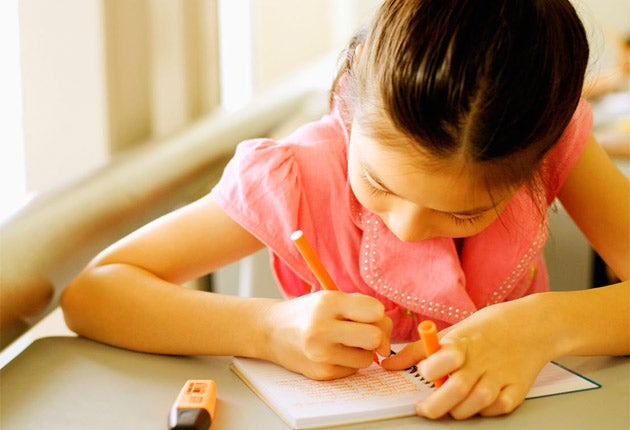One in three pupils leaves primary school struggling with the three Rs
Only 67 per cent of 11-year-olds reached the pass mark in all three tests - ie reading, writing and maths

More than 30,000 children are leaving primary school with a reading age of seven or below, figures revealed yesterday. National curriculum test results for 11-year-olds showed one in three were still starting secondary school struggling to master the basics of reading, writing and arithmetic.
They were a slight improvement on last year – although the number of high flyers doing better than expected fell, particularly in reading. The figures appeared to show that schools could be concentrating on getting as many pupils up to the basic level to do well in league tables at the expense of pushing brighter pupils.
Overall, they revealed the percentage of pupils reaching the required standard in English rising by one percentage point to 81. A similar increase in maths to 80 per cent was also recorded. However, the percentage reaching the pass mark in all three tests – reading, writing and maths – was 67 per cent (around 183,000 pupils).
Writing was the weakest subject with just 75 per cent reaching the required standard – although this was up four percentage points from 2010. Here boys fared considerably worse than girls with only 68 per cent achieving what was expected compared to 81 per cent of girls. The results of this year's national curriculum tests, taken by 554,000 youngsters, immediately sparked a row between the Government and teachers' leaders.
The Schools minister, Nick Gibb, said the figures showed that Labour's legacy to the nation was "a third of children who can't reach the basic standard in the three Rs and thousands of 11-year-olds who have the reading age of a seven-year-old or below".
"There has been a decline in the proportion of children – both boys and girls – who can read and write beyond the expected level," he added. "And the results of our weakest readers and writers remain a real concern."
The figures showed a slight rise – from 5 to 6 per cent (or 33,240) – in the numbers having a standard in English of aged seven and below. In addition, the number of 11-year-olds achieving a higher mark than expected has fallen from 50 per cent in reading to 42 per cent and 21 per cent in writing.
Mr Gibb said the Government's new reading tests for six-year-olds based on phonics would identify those who were struggling. However, Chris Keates, general secretary of the National Association of Schoolmasters Union of Women Teachers, said it was "myth peddlers" who were claiming standards were "disproportionately low". "Between 1995 and 2009, the proportion of pupils gaining level four (the required standard) or five in English rose from 49 per cent to 80 per cent," she added. In maths it had increased from 45 per cent to 79 per cent over the same period.
"Claims of a decline in overall standards are not credible and only serve to detract from the considerable progress within the primary education system over the past decade and a half," she said. Adrian Prandle, education policy adviser at the Association of Teachers and Lecturers, said the Government's obsession with phonics to teach reading was "unhelpful". "Children do best if they have teachers who have the freedom and flexibility to adapt their teaching to each child's learning style."
A breakdown of the results showed children in Richmond-upon-Thames doing best, with 86 per cent achieving the required standard in both English and maths.
Join our commenting forum
Join thought-provoking conversations, follow other Independent readers and see their replies
Comments